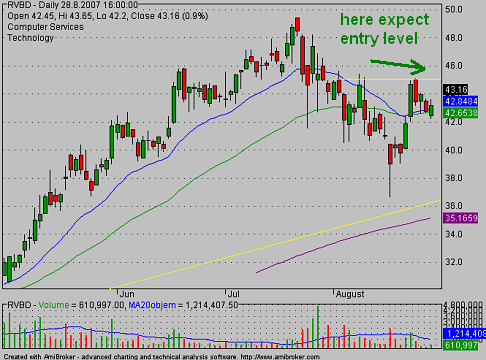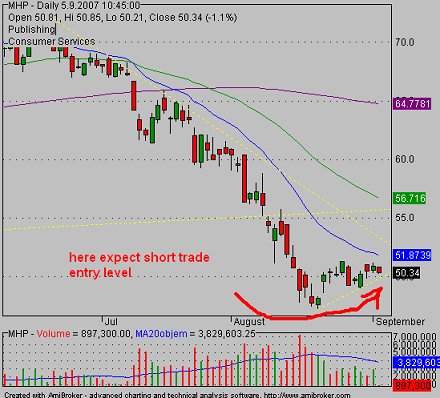The trading entry value is one of the three most important values for each stock trade setup. This value together with the a stop-loss level and the ideal target level defines every trade setup.
It is very important to find these values for every trading opportunity you found in the market. You can calculate a risk reward ratio for such a setup and decide if you can make such trade or not. Your risk reward ratio for good stock trade opportunity should be higher than three.
If your risk reward ratio is less than three you should not make a trade. You have to look for another stock trade opportunity in this case.
When to prepare the entry value for your stock trade
You should prepare every trade opportunity in advance before you make a trade. Only this way allows you to calculate risk reward ratio and think about this trade opportunity.
Fixed value method for setting a trading entry point for your trade
This is a very simple method that could be used to setup trade entry value for a trading opportunity. The idea behind this method is based on the assumption that you can add fixed value to the level of resistance in case of bullish trade.
When a price movement after a breakout or breakdown is in your favor by these predefined ranges, then you’re going to enter this trade. Here’s an example of these price values.
| stock price | breakout level |
| up to 15 USD | 0.10 USD |
| 15 – 35 USD | 0.20 – 0.25 USD |
| 36 – 50 USD | 0.30 – 0.50 USD |
| 51- 100 USD | 0.50 – 0.70 USD |
| over 100 USD | 1.00 USD and more |
So, the trade setup rule for breakout (long) trades will be:
When the price moves xx above resistance, I will enter a trade.
Example of a breakout trade setup:

The same rules you apply for pullback trades. In this case the level of support or resistance will be defined by an up or down trend line or moving averages.
You can set your price for opening the trade by two techniques:
- Using the same predefined values as above
- Using the last day’s candlestick or last two days’ candlesticks as points for comparison. When the price moves above the last one or last two candlesticks, enter a trade (a long-type trade). It’s similar for short trades, waiting until the price movement is below the last one or last two candlesticks.
Here’s an example of a short trade setup:

Pros and Cons of this trading entry method setting
The fixed value method is simple, but it is fine for many stock traders. It allows finding an buying (or selling) point quite easily.
The major weakness of this method is its inability to consider a stock volatility in the calculation. Two stocks with similar dollar value of a share could have different daily movements. Using the fixed value method could not be ideal especially for very volatile stocks.
But this method is powerful enough for the majority of stock traders and their trades. You can use this method for setting the entry very effectively in their trading for your swing or position trades.